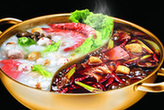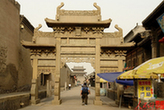On one hand, Shibi is the executor of religious rites and storyteller with a good knowledge of the Qiang legends; on the other hand, Shibi works as the spiritual support of the Qiang society and carrier of Qiang culture. In daily life, Shibi is just ordinary farmers; however, when they are invited to conduct religious rituals, they will become “gods” or wizards in the eye of the Qiang people.
In the Qiang society, Shibi is in charge of various important affairs, such as holding sacrificial rites, conducting ceremonies for promise fulfillment, fixing the date for a wedding or funeral, divining a cemetery, naming newborns, helping patients to calm the nerves and cure diseases, warding off ill luck, conducting “Kan Shui Wan (a witchcraft about watching a water bowl)”, calling up spirits from the dead and purifying negative karma.
Although the Qiang people live in a decentralized society, Shibi plays a significant role in leading and unifying all of them. Shibi provides guidance for and afford an example to the Qiang people; while the Qiang people have trust in Shibi’s authority and take part in the ceremonies held by Shibi. In spite of all the decentralized villages, Shibi and the rites conducted by them have undoubtedly promoted cultural identification in the Qiang society and solved the social problem of “decentralization”.
Classification of Shibi
Generally speaking, Shibi can be divided into three grades: the upper, the middle and the lower; different Shibi performs different functions. The upper and the middle refer to “the sages who could communicate with gods”, while the lower refers to “the warriors who deal with the devil”.
Shibi classics can also be divided into three grades: the upper, the middle and the lower. The upper classics are about gods. The upper Shibi is in charge of praying to such gods as “Tian Shen (god of heaven)”, “Tai Yang Shen (god of sun)” and “Yang Shen (god of sheep)” for good luck, favorable weather and abundant harvests. Religious rites at the village level could only be held by the upper Shibi.
The middle classics are about human beings. The middle Shibi is in charge of conducting a wedding or funeral, warding off ill luck, curing diseases and praying for treasures. They could communicate with “Jiao Jiao Shen (god of ancestors)”, “Nan Shen (god of men)”, “Nv Shen (god of women)”, “Guan Wa Wa Shen (god nursing the children)”, “Ping An Shen (god of safety)”, “Men Shen (door god)”, “Zao Shen (diet god)” and “Cang Shen (barn god)”.





Why not rent a boyfriend, or girlfriend to please parents during the Spring Festival?